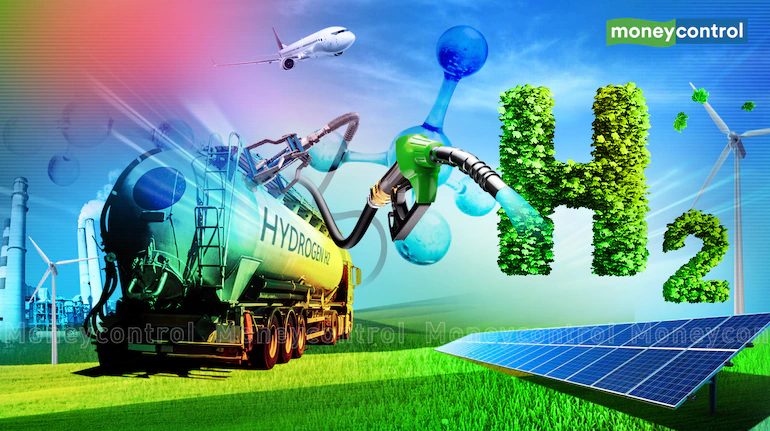GREEN HYDROGEN

Copyright infringement not intended
Picture Courtesy: www.moneycontrol.com
Context: The study by Climate Risk Horizons (CRH) raises important concerns about India's plans to produce green hydrogen and highlights potential challenges that need to be addressed to avoid worsening pollution.
Key Points from the Study:
|
Carbon Emissions from Power Generation |
●If green hydrogen manufacturing relies on power from the grid, especially during non-daylight hours when solar generation is minimal, there is a risk of using electricity from coal-fired power plants. ●Given that a significant portion of India's electricity grid relies on coal (around 70%), this could lead to increased carbon emissions instead of reducing them. |
|
Interpretation of Green Hydrogen |
●The definition of green hydrogen, as per the Ministry of New and Renewable Energy (MNRE), allows for a certain level of carbon emissions (2 kg of CO2 per kg of hydrogen). This definition leaves room for interpretation and raises questions about the actual environmental impact of the produced hydrogen. |
|
Use of Biomass |
●India's standards permit the use of biomass for green hydrogen production. However, burning biomass also results in carbon emissions, which contradicts the goal of producing environmentally friendly hydrogen. |
|
Diversion of Renewable Energy Capacity |
●The production of green hydrogen requires a substantial amount of renewable energy capacity. If this capacity is diverted from other clean energy projects, it might lead to insufficient clean electricity being available for consumers. This diversion could hinder progress toward India's renewable energy targets and delay the country's journey to achieving net-zero emissions. |
|
Financial Implications |
●The study warns against the risk of financing for renewable energy projects being redirected to green hydrogen production. This redirection could delay India's transition to clean energy, harm the emerging green hydrogen industry, and deny states and consumers the cost benefits associated with affordable renewable energy. |
Conclusion
- The concerns raised in the study emphasize the importance of careful planning and policy implementation to ensure that green hydrogen production in India aligns with the goals of reducing carbon emissions and promoting sustainable energy practices. Addressing these challenges will be crucial for India to successfully transition to a low-carbon economy.
Must Read Articles:
GREEN HYDROGEN: https://www.iasgyan.in/daily-current-affairs/green-hydrogen-1
GREEN HYDROGEN STANDARDS: https://www.iasgyan.in/daily-current-affairs/green-hydrogen-standards
GREEN HYDROGEN FUEL CELL BUS: https://www.iasgyan.in/daily-current-affairs/green-hydrogen-fuel-cell-bus
|
PRACTICE QUESTION Q. What initiatives and policies have India implemented to promote the production and utilization of green hydrogen as a clean and sustainable energy source, and what impact do these efforts have on the country's energy transition and environmental goals? |




1.png)
